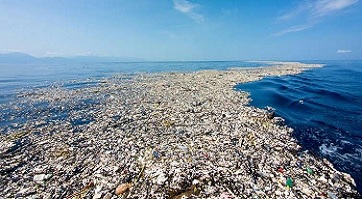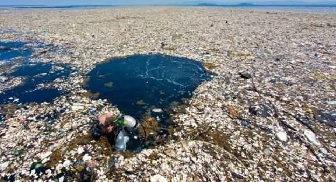Since the beginning of the industrial age, man has created over 100,000 unnatural chemical compounds, spewing or spilling them into the air we breathe, the soil our plants are grown in, and the water we drink. These chemicals enter the plants and the system of animals who ingested them and when we eat meat or fish, and even some vegetables, it goes into our system.
In addition, man has contributed and is contributing to the disaster with the increased radiation to our environment from all nuclear bomb tests and nuclear plant disasters, with microwave radiation, with thousands of medications which the body recognizes as toxins, with fuel emissions, with pesticides, insecticides and a world of household chemicals and with processed foods containing harmful additives, among other things, plus the humongous use of plastic products.
The October issue of Consumer Reports (CR) reveals the horrendous "plastic legacy" we are leaving to future generations; an inheritance that they will not be able to get rid of due to its insidious characteristics. In addition to the world-wide contamination that is causing, the major problem is that plastic products take vast amounts of time to breakdown. It takes plastics an average of over 500 years to degrade and a huge portion turns into "microplastic" in the process of degradation; that is, it turns into myriads of tons of microscopic particles contaminating our food, the air and water. We eat  them, we drink them and we breathe them.
them, we drink them and we breathe them.
The microplastic polluting the seas and oceans are consumed by plankton which travels up the food chain and eventually is consumed by us. This is extremely harmful to us, as microplastics contain chemicals such as BPA that interfere with our hormonal regulation and DEHP which is carcinogenic. And the body has no way of getting rid of them. In addition, marine life mistakenly consumes plastics for food, which causes these products to stay in their stomach invariably long periods of time as they are not biodegradable or digestible. Consequently, these marine animals starve to death with them being unable to consume enough food with their stomachs full of plastics, reducing fish and other marine food stocks.
According to the CR magazine, we are talking of about 5,000,000,000,000 plastic bags per year (over 5 trillion), over 30 billion plastic bottles that find their way to the ocean per year, some 160 million disposable razors used just in the United States (the overall number for the whole world is not known), etc., etc.
According to the CR report:
«The popular perception that plastic is easily and widely recycled has been shaped by decades of carefully calculated messaging designed and paid for the petroleum and gas companies that make most of that plastic in the first place, and the beverage companies that depend on plastic to bottle their products.
"Recycling is sold as means of not worrying about the problem" says Judith Enck, a former regional administrator at the EPA, now a visiting professor at Bennington College in Vermont and President of Beyond Plastics, a group focused on ending plastic pollution. The companies paying for the ads that frame recycling as an easy solution to a potentially devastating environmental problem know that recycling cannot keep up with the flood of new plastic, Enk says».
In fact, the Consumer Reports researchers found that only about 8,7% of plastic is ever recycled.
 Companies lower their production costs by not having to dispose of or recover waste to do an efficient recycling. They let the recycling problem fall on the shoulders of governments at the expense of taxpayers and under the responsibility of bureaucrats who show little or no interest in the task they perform. In addition, plastic is cheaper than glass, metal, and other alternative products that could be used, albeit at a higher cost of production and thus not so profitable.
Companies lower their production costs by not having to dispose of or recover waste to do an efficient recycling. They let the recycling problem fall on the shoulders of governments at the expense of taxpayers and under the responsibility of bureaucrats who show little or no interest in the task they perform. In addition, plastic is cheaper than glass, metal, and other alternative products that could be used, albeit at a higher cost of production and thus not so profitable.
Therefore, it is easy and quite convenient to their vested interests to leave this dire problem to future generations when the planet and its plant and animal life no longer resist the suffocating invasion of plastic in all its environments and the cost of recovery turns out to be so enormous that it'll be practically impossible to restore the health of the planet.
So we have to do something NOW, even through our individual initiatives if governments stall. Apart from the convenience of passing laws reducing plastics production and even banning them for certain uses, we may help by reducing our consumption as follows:
1. Avoid Plastic Straws
Use a metal straw instead of a plastic straw.
2. Bring your Own Bag Day
Allocate at least a day of the week to bring your own recycle bag when shopping for groceries.
3. Skip Plastic Packaging
Buy from bulk food stores that provide as little plastic packing as possible.
4. Bring your Own Water Bottle
Bringing your own water bottle will not only help the environment be free from one less bottle a day but also save you some money from buying a disposable water bottle.
5. Donate
Donating to organizations around the world can help to support their efforts and provide more resources for them to efficiently remove as much plastic from the ocean and our shores.
Comments powered by CComment